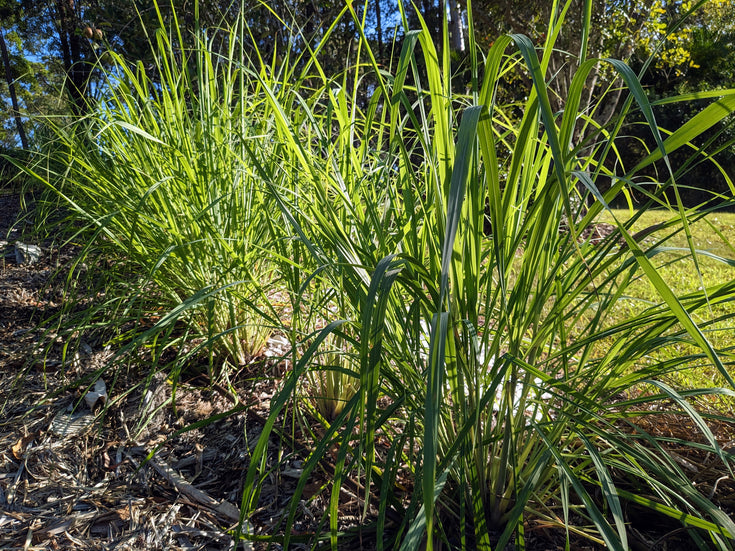Benefits of Lemongrass Essential Oil

Lemongrass oil is one of the most versatile, beneficial essential oils on the planet. A therapeutic & aromatic powerhouse, this oil can boost your mood, relieve chronic pain, treat skin conditions, and so much more. And if you aren’t sure if it’s right for you, don’t worry; we’ll break down each benefit of lemongrass oil, what it’s made from, and how you can maximise each benefit to improve your quality of life.
The Basics of Lemongrass Essential Oil
How It’s Made
Lemongrass essential oil is made from East-Indian lemongrass (Cymbopogon flexuosus), a tropical plant that’s natively grown in parts of Asia like India, Sri Lanka, and Thailand. Like most essential oils, lemongrass oil is procured via steam distillation, where hot steam is passed through raw lemongrass, forcing the oil to evaporate, where it’s contained and bottled for use.
While it's widely recognized for its aromatherapy uses, lemongrass has other uses too. Its stalks and leaves are staples in Asian dishes, as are those same parts from the West-Indian species (C. citratus). It also has skincare & insecticidal applications, which we’ll discuss later on.
What It’s Made Of
Lemongrass essential oil is composed of several natural compounds, each of which contributes its own set of healing benefits. The primary active ingredients are citral, geranyl acetate, and myrcene. Citral is the most abundant component, and is the source of the lemony aroma, while the others add fruity & earth undertones.
But lemongrass oil is more than just an attractive scent. Citral is highly regarded for its strong antimicrobial and anti-inflammatory properties. Geranyl acetate is known to aid skin cell regeneration and myrcene is believed to have pain-relieving and mood-enhancing effects.
Health Benefits of Lemongrass Essential Oil
Mood-Boosting
Lemongrass oil is an excellent natural mood booster, helping to alleviate feelings of stress, anxiety, and fatigue. It's believed to do this by increasing serotonin levels in the brain. Serotonin is one of the most important neurotransmitters when it comes to mood regulation, and is often a problem area for those diagnosed with anxiety & depression. When inhaled or diffused, lemongrass oil creates a calming environment, promoting positive emotions and mental clarity. A 2015 study suggests that it may have anxiolytic (anti-anxiety) effects, though more research is needed to be conclusive.

Pain Relief
Lemongrass has long been used for natural pain relief, and the analgesic & anti-inflammatory properties of the oil clearly indicate why. When used properly, it can provide relief from including headaches, muscle aches, and joint pain. Citral, the main component of the aromatherapy oil, has shown promise as a management agent for immunoinflammatory conditions and pain states like arthritis. When used topically during massage therapy, lemongrass oil can help ease muscle tension.
Natural Antibiotic, Antimicrobial, and Antifungal Agent
Lemongrass oil is one of the most versatile EOs when it comes to fighting bacteria, fungi, and other microbes. Previous studies have shown it to “posses strong antimicrobial efficacy against pathogenic bacteria and fungi,” particularly Staphylococcus aureus and E. coli. Again, citral is to thank for these protective benefits, which is why it’s a common ingredient in so many cleaning products. You can even make a homemade disinfectant with water, white vinegar, and lemongrass EO.
Improved Skin Health
It’s common to find lemongrass oil on the list of ingredients for skin cleansers, toners, and masks, and for good reason. The antimicrobial & anti-inflammatory properties help combat acne-prone skin by reducing inflammation and preventing the growth of acne-causing bacteria.
Plus, its astringent quality minimizes and mitigates excess oil on the skin, improving your skin's overall texture. There are studies that suggest it may also help regenerate skin cells, but the results are not yet conclusive.
Natural Deodorizer
The vibrant, citrusy scent of lemongrass oil makes it a top pick for a natural deodorant. You can add a few drops of oil and some water to a spray bottle, then spray it to neutralize bad odors in the bathroom, kitchen, and anywhere else around your home. Or, diffuse the smell throughout entire rooms to create a refreshing & uplifting environment. When sprayed or diffused, the antimicrobial properties can kill odour-causing bacteria and fungi.
How to Use Lemongrass Essential Oil
Benefits of Topical Application
Topical application is the best method to maximise the skin, pain-relieving, and anti-inflammatory benefits of lemongrass oil. To apply, combine the lemongrass oil with a carrier oil (like jojoba oil), typically at a ratio of 1-2 drops per teaspoon.
Before spreading over a large area of skin, perform a patch test on a small, less sensitive part of your skin. This approach helps minimise the damage of adverse reactions if they were to occur, though these reactions are uncommon for most people.
Benefits of Aromatherapy & Inhalation
If you're looking to tap into the mood-boosting benefits of lemongrass oil, aromatherapy/inhalation is the preferred approach. Add a few drops to your diffuser to relieve feelings of stress, anxiety, and depression, or simply when you need a pick-me-up.
If you don’t have a diffuser, or if you seek more immediate relief, you can inhale directly from the bottle to attain a similar effect. These inhalation techniques can offer pain-relieving benefits as well, which is a nice bonus.
Precautions and Side Effects
Lemongrass essential oil is generally considered safe for use for most healthy adults, but there are a few safety guidelines to keep in mind:
-
Never ingest any concentration of lemongrass oil (or any other essential oil) as it may lead to potential toxicity.
-
Always dilute the oil with a carrier oil to avoid skin irritation or other adverse reactions, then patch test before applying to a larger area.
-
Always consult with your healthcare provider before using, especially if you are pregnant, diagnosed with a specific health condition, or on certain medications.
When used properly, side effects are rare, but some people may experience minor effects like skin rashes, stomach discomfort, or nausea. But by following these precautions, you can reduce or even eliminate these possibilities altogether.
The benefits of lemongrass oil cannot be overstated; it’s a powerful, natural oil that can boost your mood, relieve pain, fight off germs, and heal skin. Not to mention, its crisp, citrusy scent can freshen up even the smelliest of rooms.



